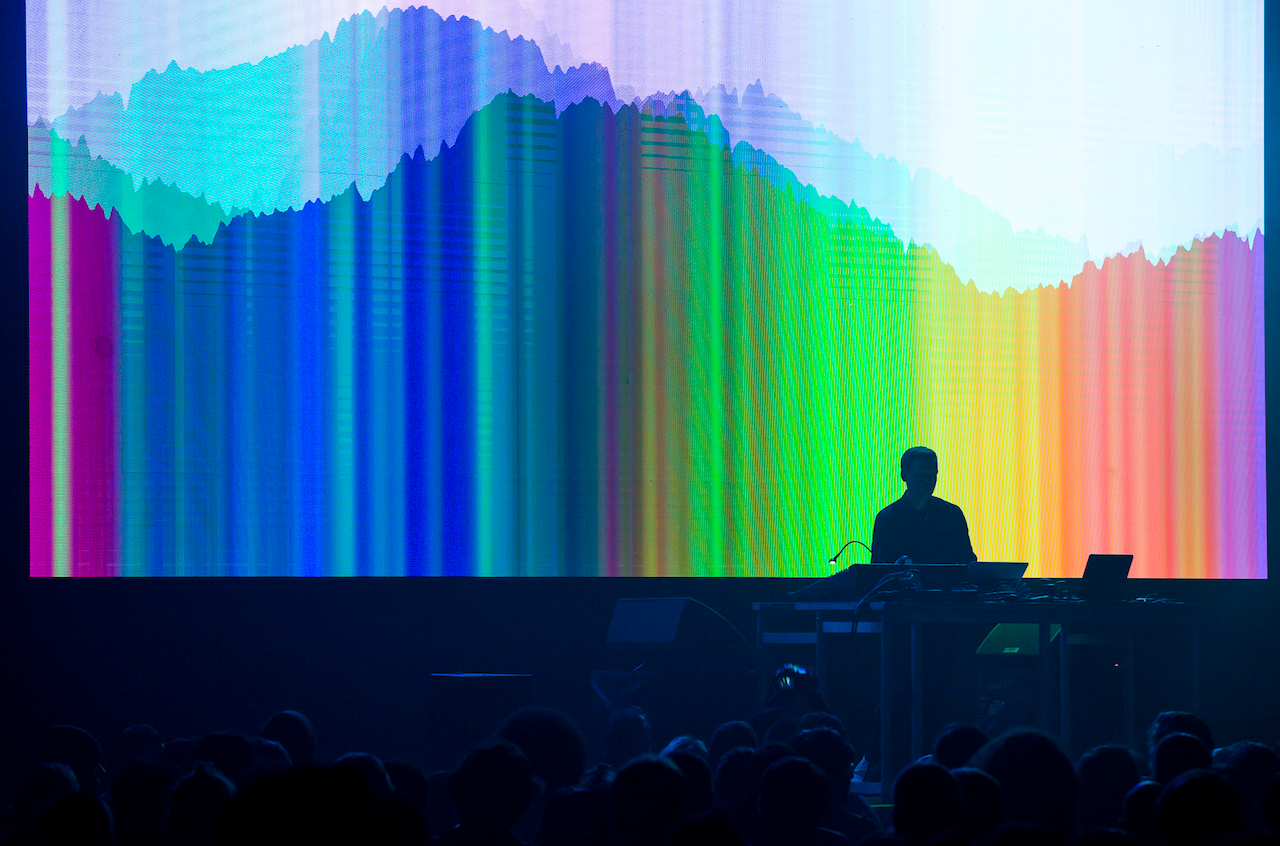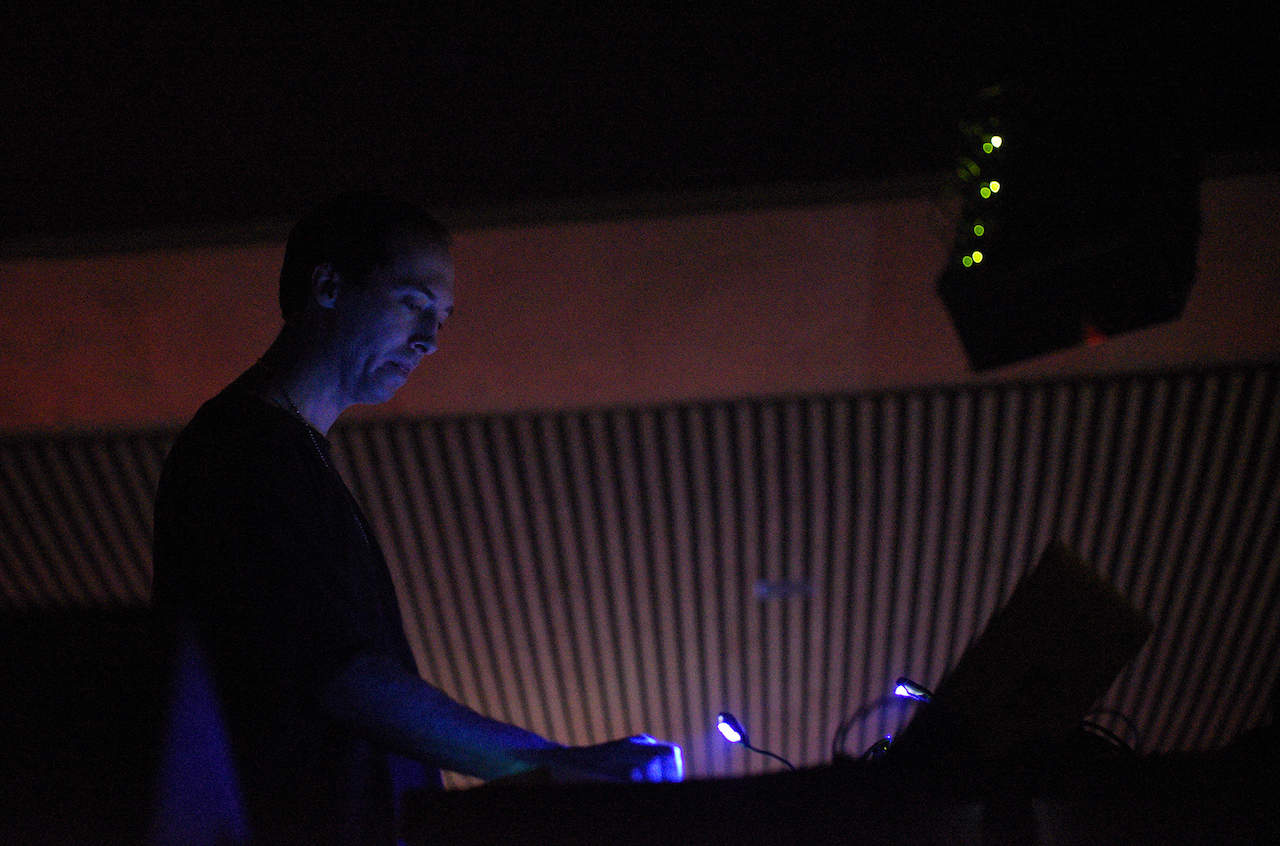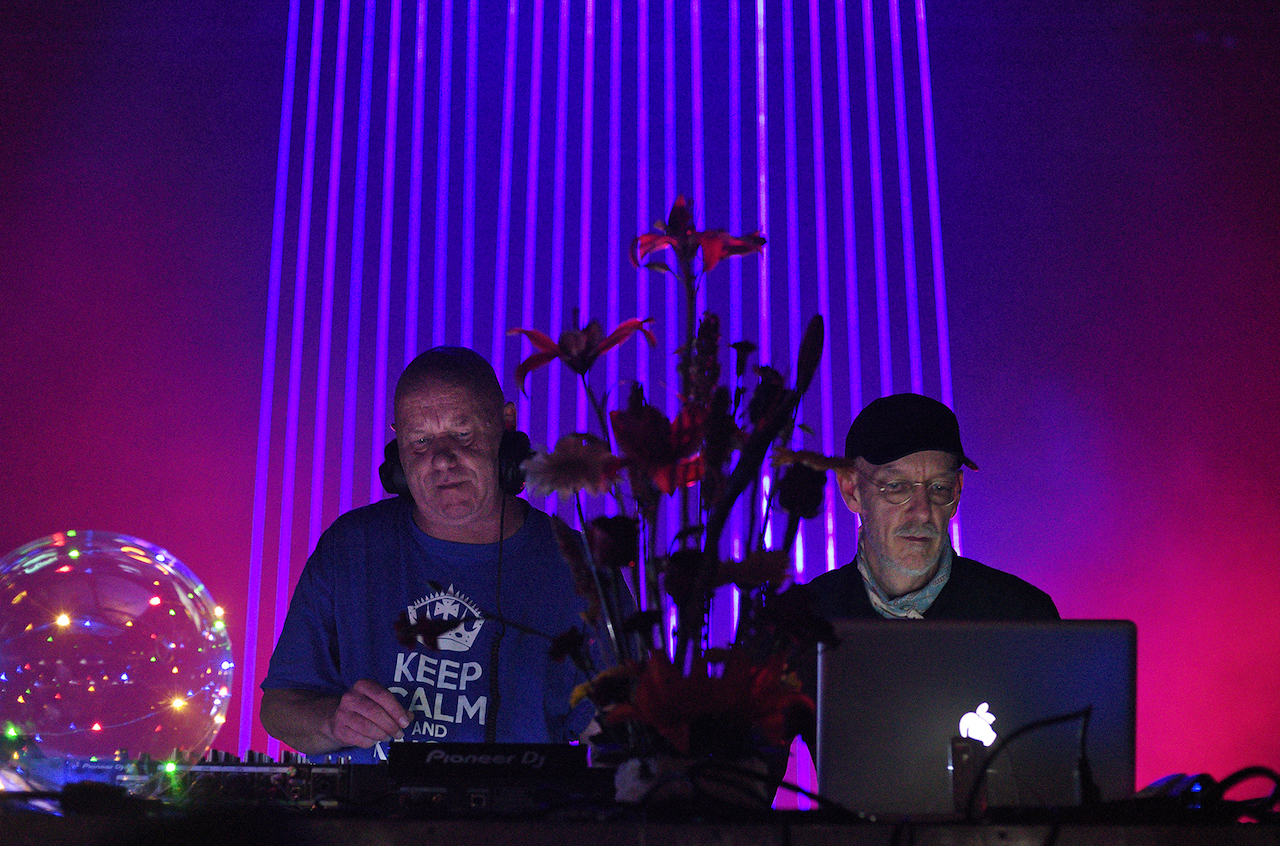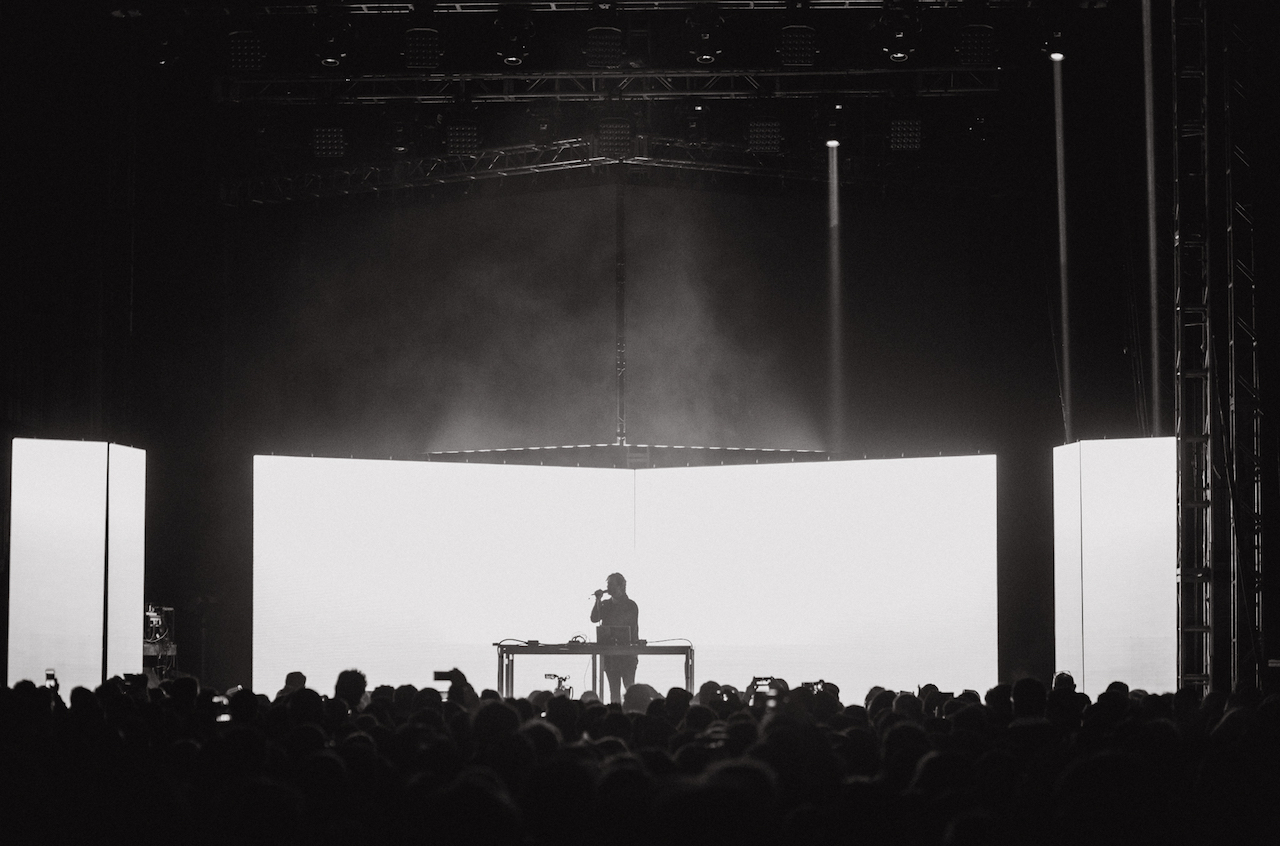- It's something of a miracle that the 14th edition of MUTEK.MX happened at all. Just weeks before, a 7.1 magnitude earthquake racked Mexico City, killing more than 300 people and leaving 4,000 injured. When I spoke with the festival's co-director Pablo Del Bosco, he told me about a deadly building collapse that occurred just blocks from the MUTEK office, about grass rippling from the quake and days spent wandering the streets, pitching in with the relief effort.
MUTEK.MX switched its dates from mid-October to late-November, reorienting its social media channels to raise money for the relief effort even as they scrambled to find structurally sound venues. They lost acts like Aurora Halal, Babyfather and Actress in the process, but there were much larger trials at hand for the city and its music community, even as they attempted to put a big, complicated festival back together again.
Arriving in late-November, the city of over 20 million people had returned to its normal, hectic pace, but remnants of the earthquake's havoc were still present in everyday life—ATMs offered the option to donate to the disaster relief, while debris from crumbling structures could be spotted near the highway. Somehow, the festival carried on in keeping with the MUTEK ethos, an ambitious amalgam of experimental electronic music, video art and technology.
Here are five key performances from across the week.
Alva Noto
Carsten Nicolai is the archetypal MUTEK artist. As technology has progressed, he's developed a detailed visual world around his music. In the interview that accompanied his 2011 RA podcast, he said, "We have lot of possibilities creating visuals with real time, working with very complex video arrangements in real time." Six years later, his score for The Revenant, a collaboration with Ryuichi Sakamoto, was nominated for a Grammy, and he continues to push the boundaries of the live audiovisual hybrid performance, lately with a show he calls UNIEQAV.
Nicolai was the first act I caught at MUTEK.MX, playing the kick-off show at Auditorio BlackBerry in Condesa. His performance took advantage of the venue's powerful line arrays and perfect sight lines, and the teeming crowd seemed half-stunned, half-entranced by the spectacle—a combination of slamming beats constructed with microhouse-level of precision and perfectly synced test pattern visuals. Musically, it was close to the "Uni" variants on his 2011 album, Univrs, but most of the material was unreleased—one highlight was a track that loosely approximated an electro breakbeat shot through with Raster-Noton's trademark austerity.
Tim Hecker
I've seen Tim Hecker play a handful of times since he's relocated to LA, and he holds close a few simple principles in his live performances. The venue has to be pitch-black and filled with fog. New ideas are introduced on a show-by-show basis, interwoven with material loosely based on the previous album, in this instance 2016's Love Streams.
When I walked into Auditorio BlackBerry on Thursday night, the TV monitors displaying the night's drinks menu had been shut off. I looked towards the stage, which was set up in the round, and couldn't make out whether Hecker was there or pre-recorded music was playing through the PA. Whatever it was sounded like falling down a mineshaft in slow motion—the music of bad dreams. I inched forwards and saw Hecker hiding in complete darkness, introducing a beautiful minor-key piano solo to balance out the creaking anxiety. Throughout the set he played these two sides against each other—seedlings of melodies mowed down by distortion, mirroring the cruelty of nature itself.
The Orb
There must be something inherently good and pure in Alex "LX" Paterson's "ambient house for the E generation." Nearly 30 years into their musical relationship, Paterson and Thomas Fehlmann are doing the exact opposite of going through the motions when they play live. Rather, Fehlmann, the erudite Swiss techno veteran and Paterson, the whimsical Battersea legend, smile as they surprise each other with new samples and sonic left-turns, often working with material they've discovered in local record stores earlier that day.
For their MUTEK.MX show, Paterson picked up a weird, clear orb filled with Christmas lights from a street vendor outside the venue and set it up right in front of his CDJs. He also put out a bouquet of flowers for his recently deceased mother. The set, which went easy on the beats in keeping with the night's ambient direction, felt as innocent and sweet as these two objects. The lilting guitars of "Star 6 & 7 8 9" hung in the air as lasers cut through mist. Towards the end, Paterson worked in The Beach Boys' immortal "God Only Knows" over "Little Fluffy Clouds," which sounded as starry-eyed as ever.
Telefon Tel Aviv
The weekend venue for this year was Fábrica, a 6,000-capacity former steel factory in an industrial neighborhood north of the city. While it had ample room for installations—there was a virtual reality room and a black mirror suspended over a rectangular pool—it wasn't always ideal for musical performances. The massive system often rattled the steel-slatted ceiling, and acts like Kelly Lee Owens felt swallowed up by the natural reverb and size of the main stage hall.
Not so for Josh Eustis, who has stormed back as Telefon Tel Aviv. Most of his set felt like an updated take on the melodic IDM sound that's earned him a legion of devoted fans—seven-year hiatus notwithstanding. These beats were now underpinned by a widescreen ambience that felt especially impactful on "Something Akin To Lust," Eustis cutting a dark profile in front of simple washes of black and white. He took the mic for closer "The Birds" off 2009's Immolate Yourself, a modern new wave classic.
Upgrayedd Smurphy
While MUTEK.MX's conventions dictate that artists usually play in front of wide-screen projections, Mexico City's Upgrayedd Smurphy upset the formula, playing her live set with the aid of three dancers, one in a kimono-like gown, one in a karate uniform and one wearing a futuristic goth-inspired getup. The kimono and the future goth began the show by slowly treading towards each other before breaking into loosely synchronized dance, though it was Smurphy's music that underlined this compelling tension. On tracks like "Mango Jungle," she used fundamental club sounds—vogue house hats and organs, the low-end heft of dubstep, and syrupy, slowed-down vocal samples—to construct something startling and new.
Photo credits /
Oscar Villanueva - Tim Hecker, The Orb
Monica Garrido - Telefon Tel Aviv
Feli Gutierres - Alva Noto, Upgrayedd Smurphy
 Tim Hecker I've seen Tim Hecker play a handful of times since he's relocated to LA, and he holds close a few simple principles in his live performances. The venue has to be pitch-black and filled with fog. New ideas are introduced on a show-by-show basis, interwoven with material loosely based on the previous album, in this instance 2016's Love Streams. When I walked into Auditorio BlackBerry on Thursday night, the TV monitors displaying the night's drinks menu had been shut off. I looked towards the stage, which was set up in the round, and couldn't make out whether Hecker was there or pre-recorded music was playing through the PA. Whatever it was sounded like falling down a mineshaft in slow motion—the music of bad dreams. I inched forwards and saw Hecker hiding in complete darkness, introducing a beautiful minor-key piano solo to balance out the creaking anxiety. Throughout the set he played these two sides against each other—seedlings of melodies mowed down by distortion, mirroring the cruelty of nature itself.
Tim Hecker I've seen Tim Hecker play a handful of times since he's relocated to LA, and he holds close a few simple principles in his live performances. The venue has to be pitch-black and filled with fog. New ideas are introduced on a show-by-show basis, interwoven with material loosely based on the previous album, in this instance 2016's Love Streams. When I walked into Auditorio BlackBerry on Thursday night, the TV monitors displaying the night's drinks menu had been shut off. I looked towards the stage, which was set up in the round, and couldn't make out whether Hecker was there or pre-recorded music was playing through the PA. Whatever it was sounded like falling down a mineshaft in slow motion—the music of bad dreams. I inched forwards and saw Hecker hiding in complete darkness, introducing a beautiful minor-key piano solo to balance out the creaking anxiety. Throughout the set he played these two sides against each other—seedlings of melodies mowed down by distortion, mirroring the cruelty of nature itself. The Orb There must be something inherently good and pure in Alex "LX" Paterson's "ambient house for the E generation." Nearly 30 years into their musical relationship, Paterson and Thomas Fehlmann are doing the exact opposite of going through the motions when they play live. Rather, Fehlmann, the erudite Swiss techno veteran and Paterson, the whimsical Battersea legend, smile as they surprise each other with new samples and sonic left-turns, often working with material they've discovered in local record stores earlier that day. For their MUTEK.MX show, Paterson picked up a weird, clear orb filled with Christmas lights from a street vendor outside the venue and set it up right in front of his CDJs. He also put out a bouquet of flowers for his recently deceased mother. The set, which went easy on the beats in keeping with the night's ambient direction, felt as innocent and sweet as these two objects. The lilting guitars of "Star 6 & 7 8 9" hung in the air as lasers cut through mist. Towards the end, Paterson worked in The Beach Boys' immortal "God Only Knows" over "Little Fluffy Clouds," which sounded as starry-eyed as ever.
The Orb There must be something inherently good and pure in Alex "LX" Paterson's "ambient house for the E generation." Nearly 30 years into their musical relationship, Paterson and Thomas Fehlmann are doing the exact opposite of going through the motions when they play live. Rather, Fehlmann, the erudite Swiss techno veteran and Paterson, the whimsical Battersea legend, smile as they surprise each other with new samples and sonic left-turns, often working with material they've discovered in local record stores earlier that day. For their MUTEK.MX show, Paterson picked up a weird, clear orb filled with Christmas lights from a street vendor outside the venue and set it up right in front of his CDJs. He also put out a bouquet of flowers for his recently deceased mother. The set, which went easy on the beats in keeping with the night's ambient direction, felt as innocent and sweet as these two objects. The lilting guitars of "Star 6 & 7 8 9" hung in the air as lasers cut through mist. Towards the end, Paterson worked in The Beach Boys' immortal "God Only Knows" over "Little Fluffy Clouds," which sounded as starry-eyed as ever. Telefon Tel Aviv The weekend venue for this year was Fábrica, a 6,000-capacity former steel factory in an industrial neighborhood north of the city. While it had ample room for installations—there was a virtual reality room and a black mirror suspended over a rectangular pool—it wasn't always ideal for musical performances. The massive system often rattled the steel-slatted ceiling, and acts like Kelly Lee Owens felt swallowed up by the natural reverb and size of the main stage hall. Not so for Josh Eustis, who has stormed back as Telefon Tel Aviv. Most of his set felt like an updated take on the melodic IDM sound that's earned him a legion of devoted fans—seven-year hiatus notwithstanding. These beats were now underpinned by a widescreen ambience that felt especially impactful on "Something Akin To Lust," Eustis cutting a dark profile in front of simple washes of black and white. He took the mic for closer "The Birds" off 2009's Immolate Yourself, a modern new wave classic.
Telefon Tel Aviv The weekend venue for this year was Fábrica, a 6,000-capacity former steel factory in an industrial neighborhood north of the city. While it had ample room for installations—there was a virtual reality room and a black mirror suspended over a rectangular pool—it wasn't always ideal for musical performances. The massive system often rattled the steel-slatted ceiling, and acts like Kelly Lee Owens felt swallowed up by the natural reverb and size of the main stage hall. Not so for Josh Eustis, who has stormed back as Telefon Tel Aviv. Most of his set felt like an updated take on the melodic IDM sound that's earned him a legion of devoted fans—seven-year hiatus notwithstanding. These beats were now underpinned by a widescreen ambience that felt especially impactful on "Something Akin To Lust," Eustis cutting a dark profile in front of simple washes of black and white. He took the mic for closer "The Birds" off 2009's Immolate Yourself, a modern new wave classic. Upgrayedd Smurphy While MUTEK.MX's conventions dictate that artists usually play in front of wide-screen projections, Mexico City's Upgrayedd Smurphy upset the formula, playing her live set with the aid of three dancers, one in a kimono-like gown, one in a karate uniform and one wearing a futuristic goth-inspired getup. The kimono and the future goth began the show by slowly treading towards each other before breaking into loosely synchronized dance, though it was Smurphy's music that underlined this compelling tension. On tracks like "Mango Jungle," she used fundamental club sounds—vogue house hats and organs, the low-end heft of dubstep, and syrupy, slowed-down vocal samples—to construct something startling and new. Photo credits / Oscar Villanueva - Tim Hecker, The Orb Monica Garrido - Telefon Tel Aviv Feli Gutierres - Alva Noto, Upgrayedd Smurphy
Upgrayedd Smurphy While MUTEK.MX's conventions dictate that artists usually play in front of wide-screen projections, Mexico City's Upgrayedd Smurphy upset the formula, playing her live set with the aid of three dancers, one in a kimono-like gown, one in a karate uniform and one wearing a futuristic goth-inspired getup. The kimono and the future goth began the show by slowly treading towards each other before breaking into loosely synchronized dance, though it was Smurphy's music that underlined this compelling tension. On tracks like "Mango Jungle," she used fundamental club sounds—vogue house hats and organs, the low-end heft of dubstep, and syrupy, slowed-down vocal samples—to construct something startling and new. Photo credits / Oscar Villanueva - Tim Hecker, The Orb Monica Garrido - Telefon Tel Aviv Feli Gutierres - Alva Noto, Upgrayedd Smurphy